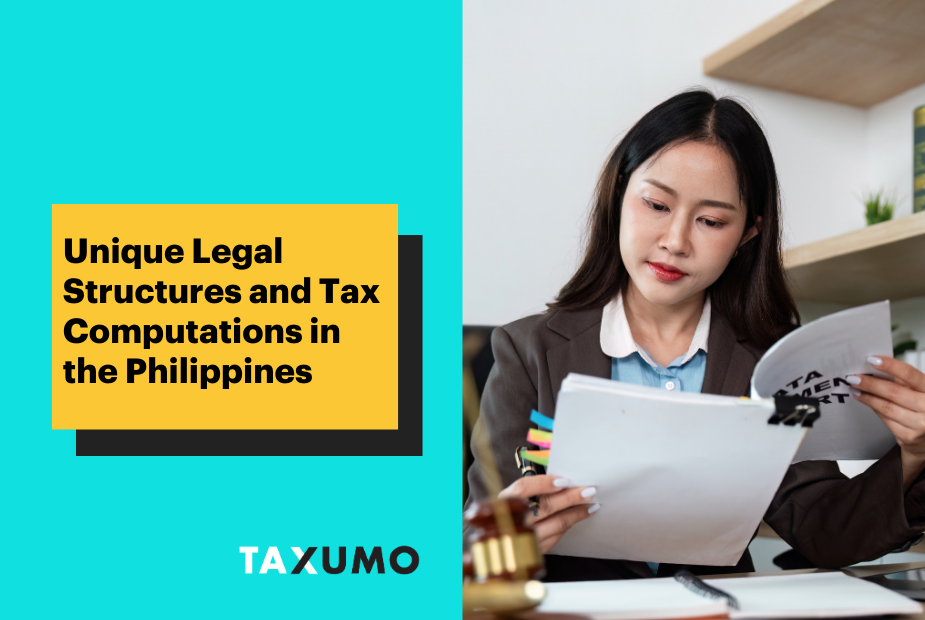What are the different business structures that can affect your tax computations in the Philippines?
- Sole proprietorship
- Partnership
- Corporation
Capital, location, and product are some of the things you have to consider when starting your own business. Each of them has the capacity to affect your tax computations in the Philippines. However, the one with the biggest impact is your business structure. It will determine the kind of business tax you will receive.
Your business structure will also dictate costing, ownership, liability, and jurisdiction requirements. These are all important aspects that affect how your business is set up and how it functions. As a business owner, you should read up on the different types of business structures and stay well-informed about all this.
Aspiring Filipino entrepreneurs can choose between three different types of business structures. They are the sole proprietorship, partnership, and corporation. Before you make a decision, you need to know what they can bring to your business, especially as it relates to your taxes. Simply continue reading to find out more about them!
Sole Proprietorship
A sole proprietorship is a business owned by a single individual, who has full authority over the enterprise. This is the simplest and least formal structure which is why it is usually the default business type for solo entrepreneurs. If you decide to go with this structure, you are going to own all assets and enjoy all profits, but you will also be the one to answer liabilities and suffer through losses.
When it comes to taxes, the owner and business are treated as one and the same. You will have to use your own tax identification number (TIN) for tax filings. The entire process is easy compared to other business structures. There is no separation between business and personal taxes. This means there’s no need to file for your business’ tax return. If you are wondering about the amount, then know that your taxes are going to be directly proportional to your income. For example, high-revenue might mean high income tax.
Many businesses start from being a sole proprietorship. It is the least formal and easiest structure to form. All you need to do to start this kind of business is to apply for a business name and register it under the Department of Trade and Industry (DTI). After which, you can conduct the business for as long as you want. Keep in mind that foreigners are not allowed to own a sole proprietorship business in the Philippines. They must choose from other structures.

Partnership
A partnership is a type of business owned by at least two or more people. There are subtypes here:
- A general partnership is where all partners have unlimited liability for the debts and obligations of the business; and
- A limited partnership is where one or more may have unlimited liability. A partner may have liability limited to the amount of his/her capital contributions.
In a partnership, you have someone to share the responsibilities and liabilities with. However, some people find this arrangement unfair especially when their partners get the same amount of income while exerting less effort to improve the business.
Unlike a sole proprietorship, the business is considered as a juridical person or a separate legal personality from its owners. This means you must file its own taxes. It is subjected to regular corporate income tax (RCIT), minimum corporate income tax (MCIT), and improperly accumulated earnings tax (IAET). Owners must also file their own taxes based on their personal share of income and losses.
Corporation
Corporations are set up by 5-15 individuals. These people are the shareholders that hold at least one share in the corporation. The liability that these shareholders have are only limited to the amount of capital they share. There are two subtypes under this business structure: stock and non-stock corporation.
The stock corporation is the most common type of business structure. Its capital stock is divided into shares which are then distributed to the holders. These are much like partnerships and are subject to the same kinds of business taxes: RCIT, MCIT, and IAET.
On the other hand, a non-stock corporation is organized for public purposes. Two examples of them are charities and foundations. One thing to note about them is that they could be exempted from paying taxes as long as they adhere to the standards of the BIR.
In both cases, the corporation is a separate entity from its owners. They need to file both of their personal and business taxes.
Key Takeaway
Tax computation in the Philippines can be quite challenging not only for individuals but for businesses as well. A lot of paperwork is involved and it can get overwhelming especially if you have little to no knowledge of business tax in the Philippines. For all aspiring entrepreneurs who are on the same boat, we hope this quick read can serve as a starting point as you enter the world of business and taxation!
